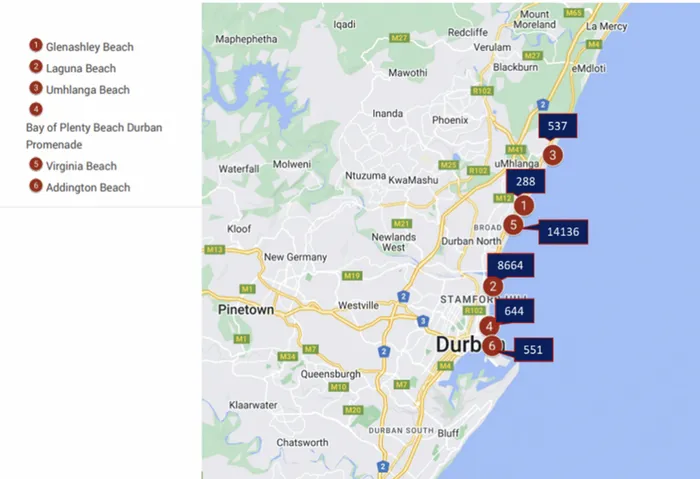22 beaches declared safe for swimming, but study finds 6 to have ‘critical levels’ of E.coli

Map of the affected beaches along the Durban coastline, which are not safe for swimming.
On Tuesday September 19 the eThekwini Municipality announced that 22 out of the 23 bathing beaches are open and safe for swimming. But then two days later - on Thursday, September 21 - the Institute for Water and Wastewater Technology (IWWT) at the Durban University of Technology (DUT) found “critical” levels of E.coli in six popular beaches in Durban.
Dr Musa Gumede, the deputy city manager for Community and Emergency Services, reported at an EXCO meeting last week that stringent sampling and testing procedures were conducted to ensure beach water quality on a weekly basis. He said last week that the latest results from these tests indicated no poor water quality of coastal waters.
Days later, however, the Institute for Water and Wastewater Technology (IWWT) at the Durban University of Technology (DUT) conducted water quality tests at some of Durban’s popular beach destinations. And the results from the six beaches under evaluation were alarming, with one of them (Glenashley) showing poor levels of E.coli in the water that was sampled, and the other five beaches were even more concerning.
Professor Faizal Bux, director of the Institute for Water and Wastewater Technology at DUT, confirmed that five beaches - Addington, Bay of Plenty, Virginia, Umhlanga and Laguna - had critical levels of Escherichia coli (E.coli) in the water.
“The situation at these five beaches is much more serious, with the water quality being rated as ‘critical’. The advice from the scientists at the IWWT is that these beaches should not be used for recreational purposes, until the E.coli levels drop to acceptable standards,” said Professor Bux.
The IWWT noted that ideal water quality would have a 0 to 130 E.coli count per 100ml; an acceptable water quality would be 130 – 200; poor would reflect a 200 – 400 E.coli count per100ml and critical would be more than 400. The independent water quality tests are conducted by the IWWT at DUT in the interest of public safety.